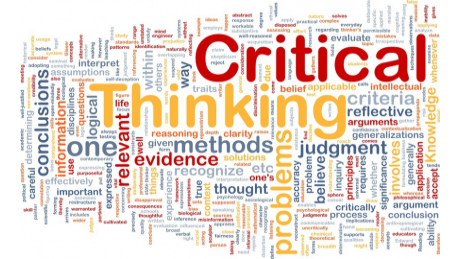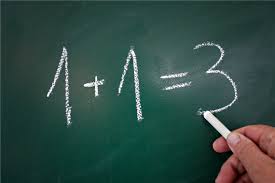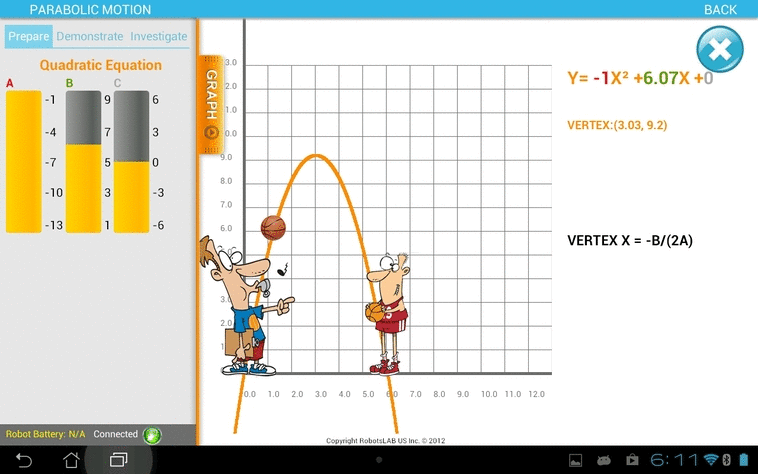RobotLAB Blog
Everything You Need To Know About Robotics in Businesses
How to Make Math Learning Fun- And Effective
Math has always been known as one of the less-glamorous subjects. Sure, there are people who love the rhythm and reason of mathematical concepts, but average Kindergartners won’t tell you that they want to be an engineer, or a mathematician, or even a computer scientist when they grow up. But if every Kindergartner grew up to be a fireman, or movie star, or race car driver, or pilot, our society would certainly suffer.

So what makes one student inherently interested in math concepts, while another just wants to score high enough on a math test to not have to take it again?
- 0 Comments
- Oct 29, 2019 10:03:00 AM
- Posted by Natalia Galvis
- Topics: Math, Robotics, EdTech, STEM, STEMchat, Mathematics, Edchat
The Importance of Education Technology in Our Changing World
Technology is everywhere and entwined in our daily lives so when technology in the classroom is used correctly it opens up possibilities for more student learning.

I strive to make my classroom a fun, engaging place to learn every day. By integrating technology into the classroom in a meaningful and purposeful way, I am able to hold and sustain a student’s love for learning. Using technology in the classroom has transformed me into an educator that is a conceptual thinker, generator of ideas, and a self-starter.
- 0 Comments
- Sep 18, 2019 10:15:00 AM
- Posted by Natalia Galvis
- Topics: Math, EdTech, STEM, teachers, Mathematics, Edchat
The Neuroscience of Math Instruction and Learning
Most educators intuitively understand that the subject of Math is more involved than just memorizing tables and formulas. In fact, research shows that the whole brain is involved in math learning. Each area of the brain is actively involved with helping the student to learn the math lessons and concepts being taught. You could even say that it is more than a math subject; it is also an executive function subject.

- 0 Comments
- Sep 17, 2019 10:15:00 AM
- Posted by Natalia Galvis
- Topics: Math, EdTech, STEM, teachers, Mathematics, Edchat
The Maths Within… Robots
There is lots of maths in robots! Think of almost any of the clever things robots can do, its maths that makes it happen.

- 0 Comments
- Jul 12, 2019 12:56:38 PM
- Posted by Maria Alejandra Calcetero
- Topics: Math, EdTech, STEM, Robots,, Technology, Mathematics
7 Tech Tools for Your Math Class
Did you like math when you were growing up?
A lot of you probably didn’t, right? Well, then it comes as no surprise that some of your students may not be so passionate about math as well right?
Kids nowadays are attracted by technology which makes sense as a lot of them are gaining access to it making it easier to keep them focused on math through technology. This is a great time for you as a teacher to incorporate the popularity and convenience of technology into your classroom to interest your students and keep them interested. You can keep them interested in math with fun games, apps, online math tools, and websites to enrich your math classroom teaching experience.

Here are7 virtual tools that can promote your student engagement and increase their academic success:
- 0 Comments
- Nov 20, 2017 6:02:52 PM
- Posted by Maria Alejandra Calcetero
- Topics: Math
Introducing STEM to your kids in their daily life

With the growing demand of Science, Technology, Engineering and Math (STEM) related occupations, the focus on STEM education has jumped significantly in recent years. However, the majority of kids nowadays have little to no interest in STEM subjects. The way they are introduced to STEM subjects in schools is unengaging and unrelated to their lives. They can’t connect the logic between Math formulas and living out their daily activities. Children should really be exposed to STEM in their homes since early age.
- 0 Comments
- Jul 21, 2017 4:23:11 PM
- Posted by Priscilla Eklund
- Topics: Math, STEM, students, science, Technology, Kids, Engineering, children
Do we really need to teach Algebra?
One of the most debatable topics these days is whether we should keep teaching high school math or not.
“Where will I use it in my life” is common feedback from the grouchy students. However, studies show that students don't mind practicing math, its testing math where we lose them.
And we lose them badly. In 2016 a Paris-based Organization for Economic Cooperation and Development (OECD) unveiled the results of an international math quiz that showed U.S. high school students lag behind their global peers in math, ranking 40th in math out of 72 countries last year. The U.S. score was down 17 points from 2009 and 20 points below the average of others taking the quiz, which saw Singapore come out on top, followed by Japan, Estonia, Finland, and Canada.
As a result of this failure, many in and out of the school system advocate to “lower the bar”, drop Pre-Calc, Algebra II or even Algebra I from the curriculum (and standardized testing) and help students overcome the “math anxiety” by bypassing the subject altogether.

- 0 Comments
- Jul 6, 2017 4:26:03 PM
- Posted by Anna Sandler
- Topics: Math, Education, algebra,, students
Astrophysicist Neil Degrasse Tyson Says It's Better To Die Rich!
Astrophysicist Neil Degrasse Tyson is a well-known TV personality whose education and experience in physics have qualified him to make pronouncements of great weight in the area of --as you might guess--astrophysics. While his background in economics may be somewhat obscure, one thing he said recently at a press conference held at the American Museum of Natural History in Manhattan can be taken to the bank! “Everything we know about science and technology,” he said, “tells us that they are the engines of the future economies. They are the seeds of tomorrow’s growth of wealth. I’m not going to twist your arm to get you to like science, but I don’t have to twist your arm to make you like money. If you don’t want to die poor you should invest in STEM.”
- 0 Comments
- Jun 18, 2016 7:29:14 PM
- Posted by Mike Nardine
- Topics: Math, STEM, Press
Why Do Americans Stink at Math?

A 2012 study of adults in 20 countries found that Americans ranked near the bottom in numeracy. Numeracy being defined simply as the ability to work with and understand numbers. What’s worse is that other studies showed that even the most educated among us displayed a deplorable inability to work with numbers: almost twenty percent of medical prescription showed math mistakes on the part of doctors and pharmacists. How can this be?
Why Do Americans Stink At Math is the title of an article written by Elizabeth Green for the New York Times Magazine on Sunday, July 23, 2014. The thesis is that the deplorable state of math education in the USA is the result of poor carry through on the part of our most highly placed educators. In spite of attempts to change the teaching of math by engaging students in actually studying math rather than memorizing it, the change is not happening. As evidence of this failure Ms Green relates the story of a Japanese educator who used math-teaching theory and methods developed in the USA to improve Japanese schools by engaging students but found these same theories and methods either ignored or misunderstood and misused in American schools. That Japanese educator thinks “Americans might have invented the world’s best methods for teaching math to children, but it was difficult to find anyone actually using them.” Again, why?
According to the article, American educators in the most important and influential teaching colleges don’t actually spend a whole lot of time teaching; they are into research and publishing. The result is great theory but poorly communicated methodology with the teachers actually teaching students. Common Core Standards provide us with a recent example of this disconnect.
Explains Ms Green, “With the Common Core, teachers are once more being asked to unlearn an old approach and learn an entirely new one, essentially on their own. Training is still weak and infrequent, and principals — who are no more skilled at math than their teachers — remain unprepared to offer support. Magdalene Lampert, a professor of education at the University of Michigan notes “In the hands of unprepared teachers, alternative algorithms are worse than just teaching them standard algorithms.” What results, of course, is confusion leaping from teacher to student to parent. A sequence Ms Green illustrated with this amusing anecdote: The comedian Louis C.K. parodied his daughters’ homework in an appearance on “The Late Show With David Letterman”: “It’s like, Bill has three goldfish. He buys two more. How many dogs live in London?”
Textbooks haven’t really made the jump to Common Core either. They have “have received only surface adjustments, despite the shiny Common Core labels that decorate their covers.” On the textbook issue, no less a personage than Phil Daro, a senior member of America’s Choice and one of three principal writers of the math Common Core Standards agrees, “To have a vendor say their product is Common Core is close to meaningless…”
It is not necessary to agree with every point made in this article to agree with the overall conclusion so succinctly implied by the title, that Americans do indeed stink at math. And there is no doubt that teaching methodology must be greatly improved if we in this country are to retain our technological superiority. Engagement, not rote learning must be encouraged. Our goal here at RobotsLAB is to provide teachers with technological aids, our robots and included curricula, that will engage and encourage students to study rather than memorize.
- 0 Comments
- Oct 17, 2014 3:09:00 PM
- Posted by Mike Nardine
- Topics: Math
What makes a parabola relevant to kids?

Conveying to kids the idea that math plays an important part in their lives is, as any math teacher can tell you, one of the most difficult things about teaching math. The blackboard, the book and rote memorization were for years the only tools math teachers had; that, and the hope that they were getting it across. As most of us are aware, for the great majority of kids over the years it wasn’t enough.
- 0 Comments
- Jul 16, 2014 12:00:00 PM
- Posted by Anna Sandler
- Topics: Math, EdTech, 21st Century Classroom
Relevant Posts
- Augmented Reality: A Tool for Teaching Students Robot Programming
- Fostering Innovation Through Youth Education in STEM and EdTech
- How Parents Can Foster STEM Learning Beyond the Classroom
- How Robotics Cultivates a Deep Understanding of Mathematics in Students
- RobotLAB Receives EDTech Chronicle 2023 ‘BESTIE’ Award for Landmark Partnership with American Samoa Dept. of Education.
Subscribe to Email Updates
-
I Want To Learn MoreADDITIONAL INFORMATION
